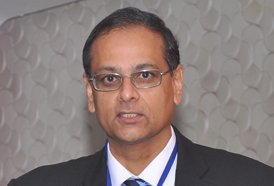Front-runner in nanoscience - <I>Dr Murali Sastry</I>
December 12, 2012 | Wednesday | Features | By Rahul Koul Koul
Front-runner in nanoscience
Dr Murali Sastry, director, DSM India Innovation Centre, Gurgaon
"As scientists we obviously would like to publish papers, but the benefits must be enjoyed by the society. Translational research is such that it always gives you pleasure," says Dr Murali Sastry, who developed Swach, a low-cost water purifier with enormous societal impact. A well known nanobiotechnologist, Dr Sastry has close to 25 years of research experience in the field of materials chemistry.
An interdisciplinary scientist, Dr Sastry was instrumental in creating a Centre for Nanotechnology, funded by the Department of Science and Technology (DST) at National Chemical Laboratory (NCL), Pune. In 2005, he moved to TATA Chemicals as chief innovation officer and set up the innovation center that delivered the low-cost water purifier, Swach. In Nov 2011, he moved to DSM India, where he is the director of India Innovation Centre that will incubate new businesses for DSM in areas on national relevance.
Dr Sastry's higher education started in 1982 with Masters in physics and continued with a doctorate in thin film technology from the Indian Institute of Technology, Chennai in 1987. Thereafter, he went on to work as a postdoctoral fellow between 1988-91 at the International Centre for Theoretical Physics at Trieste, Italy. He worked as a visiting faculty at the University of Maryland at College Park, USA in the year 1998-99 and at CNRS in Orsay, France from 2001-03. He continued as a federation fellow at the Royal Melbourne Institute of Technology, Melbourne and as professor in Department of Atomic Energy at Central University, Hyderabad in the year 2006.
Dr Sastry has authored over 360 international publications, 10 chapters in books besides holding 20 Indian and US patents. He has a number of national and international awards to his credit including the Shanti Swarup Bhatnagar Prize in Chemistry in 2003 for incisive work on nanomaterials. More recently, he was awarded the Thomson Reuters Research Excellence - India Citation Awards 2012 in the area of nanobiotechnology.
Besides being the editor for the Materials Research Bulletin (Elsevier), Dr Sastry serves on the international advisory boards of seven leading chemistry journals. He is also the associate editor (Asia) of Applied Nanoscience.
He has earlier served on advisory boards for the Department of Biotechnology (DBT), DST, Presidential Nanotechnology Committee, and Council of Scientific and Industrial Research (CSIR), Government of India.
Currently at DSM, Dr Sastry is looking for suitable ideas and opportunities in the nanobiotechnology. His research interests include interfacing biologicals with inorganic nanomaterials, understanding biological process in their nanodimensions, developing new industrially relevant renewable materials and green processes, as well as addressng the ethical issues in application of nanomaterials.
Though excited about the government initiatives, Dr Sastry feels that there is still lot more to be done. "Government agencies are doing their bid. DST has many programs in nanotechnology and many incubators too have been put up. Good quality research is being carried out at the Indian institutes, but it will still take time to establish a firm connection. What requires to be done now is the industry involvement in the product development. The interface between the industry and the public institutes has to be much better," opined Dr Sastry.









